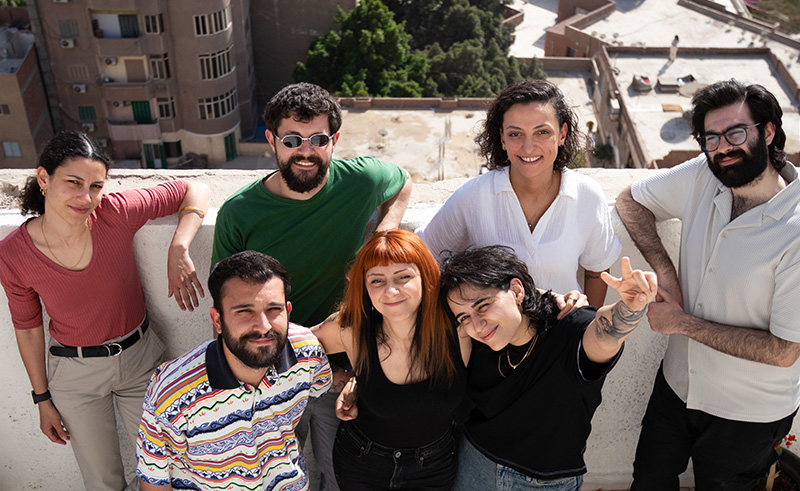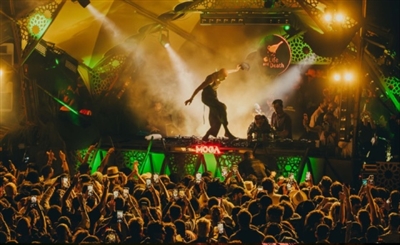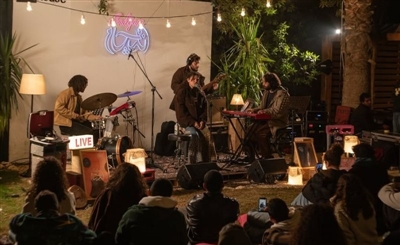Inside Beirut and Beyond’s First Music Production Residency in Cairo
Led by Tunisian producer Deena Abdelwaheed in partnership with WRST collective, the residency provided emerging Lebanese producers with a space for experimentation, learning and cultural exchange.

Back in April 2025, Beirut and Beyond, a Lebanese-bred organization and festival that has quickly grown into a sustainable platform for artist development, hosted a nine-day music production residency for the first time in Egypt.
Led by Tunisian DJ and producer Deena Abdelwahed in partnership with Cairo-based WRST collective, the residency’s core mission was to provide six selected participants of emerging Lebanese producers with a space for experimentation, learning and cultural exchange.
This residency came as a second revisited edition of Beirut and Beyond’s ‘Rap & Beyond’ initiative, an artistic residency which was launched in 2023 in collaboration with Sweden’s World Culture Museums, inviting hip-hop womxn artists from the SWANA region to Beirut for one week to attend a series of workshops and collaborative music sessions, led by Noise Diva.
Beirut and Beyond initially planned for the residency to take place in Lebanon in late 2024 as part of the MASAR, a two-year program supported by the FSPI grant from the Institut Français. However, due to the ongoing genocide in Palestine and the escalation of the Israeli attacks on Lebanon, the residency was relocated to Cairo instead.
“Cairo quickly was a natural fit for the residency, with its dynamic music scene, regional accessibility, and potential for building new networks and collaborations.” Yara Mrad, Program Manager, Beirut and Beyond, tells SceneNoise. However, the move proved beneficial, as participants were given the opportunity to immerse themselves in Cairo’s musical landscape, attending a Zaar performance by the infamous group Mazaher. Egyptian multi-instrumentalist YUNIS joined the participants in WRST studio, where he shared his creative process and the inspirations behind his new record, and later invited them to attend his album launch party at Cairo Jazz Club.
Deena Abdelwahed, a trailblazing producer herself who has been making waves in the electronic music scene across MENA, Europe and beyond –guided participants on everything, from composition and sound design to navigating the industry and building sustainable careers. Her approach wasn’t about imposing a set method, but rather encouraging self-discovery. “Rather than following a rigid curriculum, the program was designed based on an open-ended and discursive approach, allowing artists to define, or redefine, their artistic direction through dialogue, feedback, and creative trials,” Mrad notes.
Collaboration with local music collectives and record labels in Cairo, particularly WRST collective, played a pivotal role in shaping the experience on the ground, providing the logistical support and direct connections needed within Egypt’s music community. Participants got to attend a workshop with the lo-fi and electro-shaabi maestro, El Waili, right in his own studio, where he demystified his personal approach to beat-making and storytelling through production, further contributing to the residency’s emphasis on practical knowledge sharing. Meanwhile, at Cairo Jazz Club, Egyptian sound engineer Nazli Reda also gave the participants a hands-on technical workshop on live performance, walking them through the D Day checklist and soundcheck technicalities.
“This helped the participants explore new ways of thinking about sound, audience, and community, allowing them to step outside of their usual context while remaining connected to the regional fabric that binds us.” Yara explains.
But, beyond the technical skills, the residency encouraged participants to engage with deeper artistic questions “Altogether, we wanted to emphasize process over product, supporting the participants in asking the difficult but essential questions around what makes their sound distinct, and how to keep evolving it with clarity and intention.” Yara shares with SceneNoise.
This focus is crucial, especially for artists in the region who often don’t have the privilege of dedicating uninterrupted time to their practice, as they struggle with financial instability and the need for stable side jobs, which frequently get in the way of creative exploration. As Yara puts it, “Residencies like this one offer a much-needed space and time for artists to step away from their daily realities and focus solely on developing their music and sound.”
Looking ahead, Beirut and Beyond plans to continue supporting the participants of the residency by showcasing their work and offering further opportunities. This Cairo residency is just the initial thread of a larger vision to build a network of residencies that, according to Yara Mrad, “not only support individual artistic journeys but also contribute to a vibrant, interconnected cultural landscape throughout the MENA region.”
Trending This Month
-
Jan 29, 2026
-
Feb 20, 2026






















